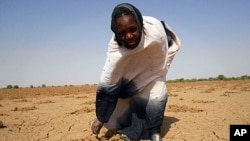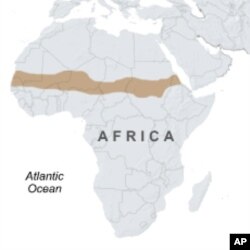The United Nations' Children's Charity UNICEF warned Friday that time is running short to provide life-saving treatment to children in the Sahel region of northern Africa which stretches from Mauritania to Chad.
UNICEF says even in a best case scenario more than one million children under the age of five will be entering feeding centers over the next six months suffering from severe acute malnutrition. Spokesperson Marixie Mercado, based in Geneva, told VOA that in a worst case scenario the numbers could be much higher.
"More extreme conditions could see this number rise to about 1.5 million and the problem is that funding is not coming in at the rate that we need in order to prepare properly," she said. "So far we have received just one-fifth of the $119 million we have asked for in 2012."
She says UNICEF has so far received $24 million from countries including Japan, Canada, the United States, and a number of European nations.
But she says everyone needs to dig deeper.
The $24 million is enough, she says, to provide ready-to-use therapeutic food until the end of June, a mixture of peanuts, powdered milk, sugar, oil, vitamins, and minerals. She says, this is the most effective way to battle severe malnutrition.
But she says the funding will not last beyond June and the dry, ‘lean’ season will last until August.
What is more, Mercado says food is not the only need.
"On top of that we also need other elements of the nutrition response: cholera kits, for example," she said. "Last year the Sahel saw one of the most severe cholera outbreaks in years. We need water and sanitation equipment, we need antibiotics in order to mount a proper nutrition response. And for all of that to be in place in time we need the funding now.
The Sahel region has suffered prolonged drought and a lack of food in recent decades. Mercado says the situation is exacerbated by security risks.
"The issue with the Sahel is that there are multiple crises going on right now. You have the conflict in northern Mali. You have an influx of refugees into Mauritania, Niger, and Chad," she said. "You have high levels of insecurity in northern Nigeria. All of these are factors that will affect A, our ability to provide humanitarian assistance and B, people's ability to access humanitarian assistance."
But, she says, a disaster can be avoided if an international commitment to address the crisis is backed up with the necessary funding.
According to the aid group Oxfam, 100,000 people died during a severe drought in the Horn of Africa last year because of delayed humanitarian intervention.

